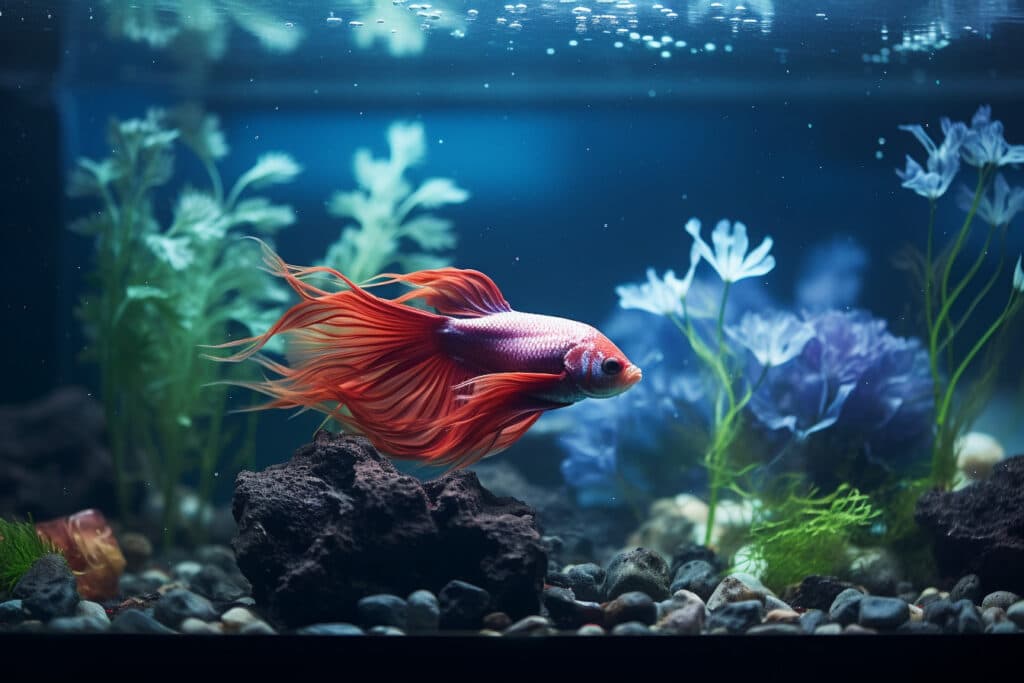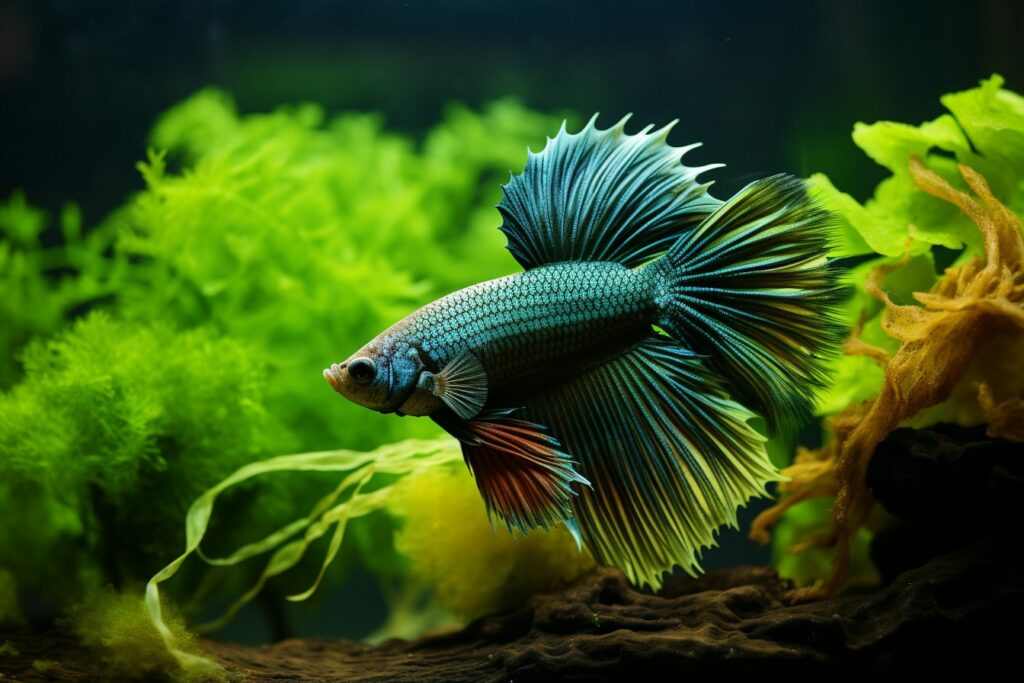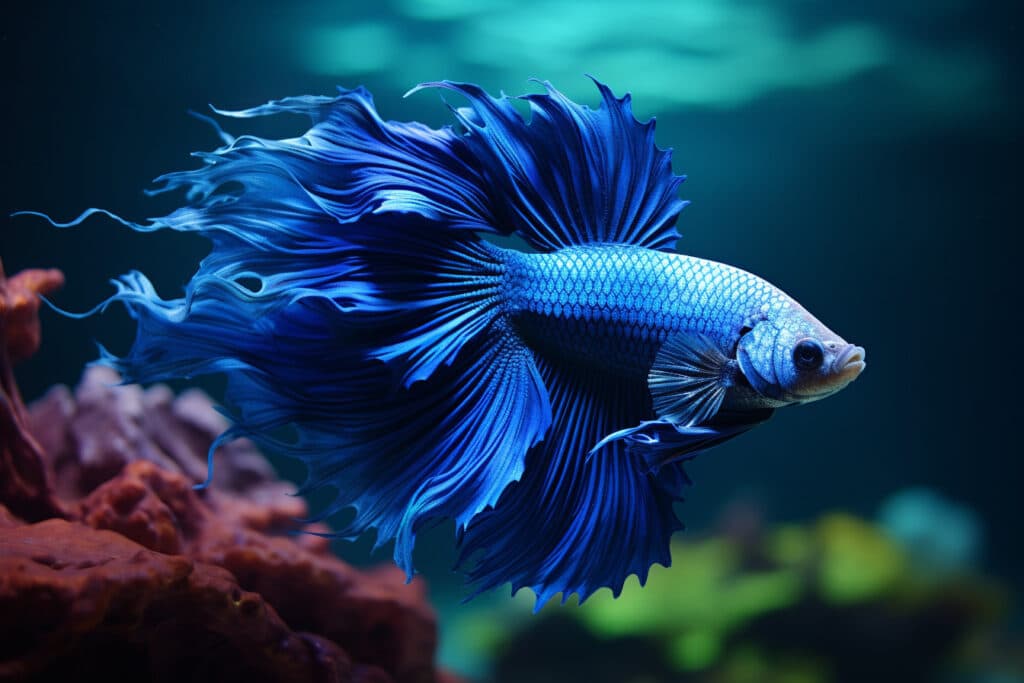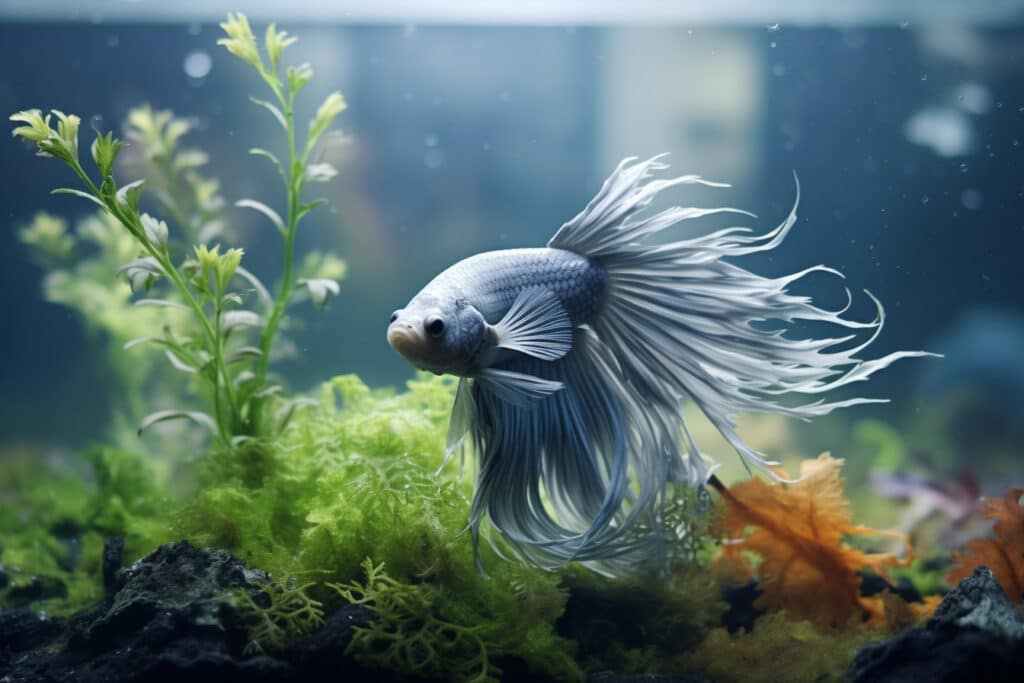Do Betta Fish Sleep?
Do Betta Fish Sleep? Or are they just taking a quick fin-nap? Join us as we plunge into the mesmerizing realm of The Siamese Fighting Fish bedtime behaviors!”

As we delve deeper into the world of betta fish and their habits, we’ll discover fascinating insights into their resting and sleeping patterns and how they compare to other aquatic creatures.
The very notion of fish sleeping can be a source of wonder and curiosity. After all, with no eyelids to close and a constantly moving environment, how do our finned friends find time to rest?
Table of Contents 🦑💤

So, Do Betta Fish Sleep?
To truly find the answer to the question “Do betta fish sleep?”, we need to plunge into the depths of betta behavior and see what’s beneath the surface.”
The Resting Behavior of Bettas
Betta fish do indeed have periods of rest, akin to what we might label as “sleep”. During these times, you may observe your betta fish settling at the bottom of the tank or finding a secluded spot among the plants or decorations.
Their movements become minimal, and their fins might droop slightly. It’s a time of recuperation and energy conservation. It’s also not uncommon for bettas to “lean” against a leaf or decoration, taking full advantage of their surroundings to find the most comfortable resting position.
However, bettas remain somewhat alert even during these resting phases. A sudden movement or change in light might prompt them to become active again. This light-responsive behavior is tied to their natural instincts; in the wild, any abrupt shift in their environment could indicate a potential predator or threat.
Comparing Betta Rest with Other Fish Species
Different fish species have varied resting and sleeping patterns. While some, like certain species of sharks, need to keep moving to ensure water flows over their gills, others, such as the parrotfish, create a protective mucus cocoon around themselves before settling down for the night.
Bettas fall somewhere in between these extremes. They don’t require continuous motion, thanks to their labyrinth organ, which allows them to gulp air from the water’s surface. But they also don’t go to the lengths of creating protective barriers for resting. Their resting pattern aligns more closely with fish that find sheltered spots or dimly lit areas when they need to recuperate.
In essence, while bettas might not “sleep” in the human understanding of the term, their periods of rest are vital for their well-being and closely aligned with their natural instincts and environment.

6 Signs Your Betta Fish is Sleeping

It’s a common curiosity among betta fish owners to wonder if their aquatic pet is sleeping or simply taking it easy.
Knowing the signs can help you ensure that your fish is getting the rest it needs. Here’s a breakdown of some typical indicators that suggest your betta fish might be catching some z’s:
Staying Still or Floating: One of the most apparent signs of a resting betta is its stillness. You might notice your betta lying at the bottom of the tank, nestled between the gravel or sand. Sometimes, they might choose to float in a quiet corner, away from the hustle and bustle of the aquarium’s other activities.
Reduced Responsiveness: When in a deep rest, bettas tend to be less responsive to their surroundings. If you move your hand close to the tank or make a slight disturbance, they might not react as quickly or might not respond at all. It’s a stark contrast to their usual curious nature when they often approach the glass to investigate any new movement.
Horizontal Positioning: While bettas can rest in various positions, a common one is a horizontal stance. This positioning can sometimes alarm new owners, as the fish appears to be lifeless. However, unless there are signs of illness, this is a typical resting pose.
Fins Relaxed: During rest, bettas often let their vibrant fins hang loose and relaxed. The flamboyant, flowing fins that are usually on display when they’re active or showing off take a break too!
Seeking Shelter: Bettas sometimes prefer to retreat to a favorite spot in the tank when it’s time to rest. This could be behind a plant, inside a cave-like decoration, or any other secluded area. They find these spots comforting and safe for taking longer rests.
Breathing Slows Down: Like many creatures, bettas’ breathing rate decreases when they are resting. You might notice fewer trips to the water’s surface for air, thanks to their labyrinth organ.
It’s essential to note that while these signs are typical of a resting or sleeping betta fish, any drastic change in behavior, appearance, or eating habits should be monitored. Prolonged periods of rest or signs of distress could indicate potential health issues.

Silicone Betta bed leaves are designed to mimic the natural environment of Betta fish, offering them a place to rest and hide near the surface of the water.

How Long Do Betta Fish Sleep?
The ethereal beauty and lively nature of betta fish are what attract many aquarium enthusiasts. Just like us, these small, vibrant creatures have their own unique sleep patterns. Understanding the duration and influences on their rest can help ensure a healthy environment for them.
Typical Betta Fish Sleeping Durations
Unlike humans, betta fish don’t have a consolidated sleep pattern that lasts for several hours at a stretch. Instead, they take multiple short naps throughout the day and night.
On average, a betta might rest anywhere from a few seconds to several minutes at a time. Over a 24-hour period, this can accumulate to several hours of rest, but it’s fragmented rather than continuous.
Influence of Light
Betta fish, like many other fish species, are influenced by the light in their environment. In natural settings, they follow the rhythm of the day, becoming more active during daylight hours and resting during the night.
In a home aquarium, the lighting you provide will play a pivotal role in establishing their rest-play cycle. Consistent light schedules, mimicking natural day-night cycles, are ideal for bettas. It’s also why many experts recommend turning off aquarium lights during the night to give fish their “nighttime.”
Environmental Factors
The ambiance of the tank can significantly influence a betta’s sleep pattern.
Factors such as water quality, temperature, and even the presence of other fish can impact their rest durations. For instance, a betta in a stressful environment might not rest adequately, while one in a serene, well-maintained tank will have more regular rest patterns.
The Importance of Darkness
Just as humans require darkness to produce melatonin and regulate sleep, betta fish benefit from periods of darkness. While they don’t have eyelids to close, darkness signals to them that it’s time to rest.
Making sure your betta fish gets its chill time is super important for keeping them happy and healthy. They snooze in little bits here and there instead of all at once like us, and love having regular light and dark times to know when to be awake or take a rest.
So, let’s help them out by keeping their tank peaceful and turning off the lights sometimes, ensuring they stay our lively, colorful buddies.

Ensuring a Good Sleep Environment for Your Betta

When it comes to any pet, creating an environment that’s as close to their natural habitat as possible is pivotal for their health and well-being. For bettas, this extends to ensuring they have an optimal environment conducive to both their active and rest phases.
Importance of a Proper Habitat
Betta fish is a tropical fish, originally from the tranquil rice paddies of Thailand, are accustomed to calm, warm waters. In captivity, replicating this environment is essential, not just for their daily activities but also for their rest periods.
A stress-free environment leads to a well-rested betta, contributing to its overall health and longevity.
Correct Tank Size
While betta fish can survive in smaller spaces due to their labyrinth organ (which allows them to breathe atmospheric air), it doesn’t mean they should.
A tank that’s too small can lead to stress, limiting their space to explore and, subsequently, rest. A minimum of a 5-gallon tank is recommended for one betta 10-gallon tank and above is even better! This ensures enough room for swimming, exploring, and finding those perfect spots to take a nap.
Providing Hiding Spots
Just like we have our cozy beds, betta fish appreciate hiding spots or areas where they can retreat to and feel secure. Consider plants, caves, or even ornamental structures that can provide shelter. Not only do these additions make the tank more visually appealing, but they also offer your betta a feeling of safety and seclusion when they want to rest.
Proper Lighting and its Influence on Sleep Patterns
As previously discussed, lighting plays a significant role in regulating a betta fish’s sleep-wake cycle.
Invest in a good aquarium light with a timer, ensuring it mimics a natural day-night cycle. Remember, consistent periods of light and darkness are crucial for their well-being.
Importance of Water Quality
Just as a dirty or uncomfortable bed would disrupt our sleep, poor water quality can be distressing for betta fish.
Regular water changes, proper filtration, and monitoring of water parameters (like pH, ammonia, and nitrite levels) are essential. Clean, stable water conditions reduce stress and potential health issues, paving the way for better rest for your betta.
In conclusion, understanding and catering to your bettas sleep and rest needs are integral to its overall health and happiness. With the right environment and care, you can ensure your aquatic companion enjoys a balanced, fulfilling life in its home aquarium.

Betta Fish Sleep FAQ Section
Navigating through the curious and intricate world of betta fish and their sleep patterns can generate numerous questions for pet owners. Let’s delve into some of the frequently asked questions related to betta fish and their sleep.
Q. Do betta fish close their eyes when they sleep?
A. Unlike humans, betta fish don’t have eyelids, so they don’t close their eyes when they sleep. This characteristic often leads to a natural curiosity: “How can I tell if my betta is sleeping if its eyes are open?” Typically, observing their movement and positioning (like staying still, hovering, or Chilling at the bottom of the tank) will give you an indication that they are in a restful state.
Q. Can betta fish experience sleep disorders?
A. While comprehensive studies on fish sleep disorders are limited, there have been observations and reports of betta fish experiencing issues with their sleep.
Factors like stress, improper lighting, or suboptimal water conditions can potentially disrupt their rest.
Additionally, constant disturbances, such as noise or movement around the tank, might prevent your betta from obtaining the rest it needs.
Observing your betta and ensuring it has a consistent and undisturbed rest period is crucial for its well-being.
Q. How can I tell if my betta is sick or just sleeping?
A. Differentiating between a sleeping betta fish and one that might be unwell can sometimes be challenging due to their stationary resting behavior. Key indicators to distinguish between the two involve observing the fish’s behavior during its active period.
A healthy sleeping betta should be active and responsive when awake, exhibiting behaviors such as exploring its tank, responding to feeding, and displaying vibrant colors.
On the other hand, a sick betta may showcase clamped fins, faded colors, erratic swimming, or a lack of interest in food even during its typical active periods. Regular observation and understanding of your betta’s normal behavior will assist you in identifying any unusual signs early on.
Navigating through the complexities of betta fish care may raise numerous questions, especially when trying to understand their rest patterns and requirements. Consistently observing and ensuring that your betta has a supportive environment will pave the way for a healthy, vibrant, and happy aquatic companion.
If you notice any unusual behaviors or have further questions, don’t hesitate to reach out to a veterinarian specializing in fish or an aquarist expert.

Conclusion
A universe of vibrant colors, subtle gestures, and tranquil moments reside within the enchanting world of betta fish. These aquatic marvels, with their flowing fins and striking hues, not only adorn our living spaces but also usher in a serene connection with the aquatic world.
Understanding every facet of their life, including their rest and sleep patterns, becomes a pivotal part of ensuring their well-being and vitality.
Sleep, or the restful periods experienced by betta fish, isn’t just a fascinating phenomenon but a critical component of their health and vigor.
Recognizing the signs of a sleeping betta, distinguishing it from potential health concerns, and comprehending their sleep-related behaviors are instrumental in providing them with a nurturing environment. From ensuring that their habitat is conducive to rest, to respecting their unique rest patterns, every nuanced care detail contributes to their overall quality of life.
In our journey through understanding bettas and their sleep patterns, we’ve explored the various facets of their rest, behavioral attributes, and the pivotal role of a conducive environment. Ensuring that your betta has a suitable tank, optimal lighting, clean water, and a stress-free environment are non-negotiable aspects of facilitating a healthy life for your aquatic companion.
Embracing the role of a mindful and informed betta parent means constantly observing, learning, and adapting to the needs of your scaly friend. It’s within this attentive care and keen observation that you’ll not only be affirming life to your betta but also embarking on a rewarding journey where every bubble, every glide, and every restful moment becomes a shared experience of coexistence.
May your betta’s fins glide smoothly through calm waters, and may its restful moments be peaceful, for in the care of a dedicated owner, it shall find its sanctuary. Here’s to many tranquil moments ahead for you and your betta fish, within a world where care, knowledge, and tranquility flow in harmony.
Thank You
Thank you to every avid fish enthusiast who dove deep into our ocean of knowledge today!
Navigating through the world of a “sleeping fish” can be both mesmerizing and a tad perplexing, especially for our beloved bettas.
Betta sleeps might seem like a mystery wrapped in aquatic silk, but knowing how your betta sleeping patterns work is key to optimal betta fish keeping.
For betta owners, understanding these delicate moments of “deep sleep” not only aids in creating a serene environment for your tropical fish but also ensures you’re not startled into thinking you have a “dead betta” during their still, quiet moments. Keep swimming through your fish-keeping journey with us, and let’s continue to explore the mesmerizing underwater world together, ensuring our finned friends experience the best
Stick with us for more underwater adventures and insights at Bettareef.com, and let’s continue exploring the enchanting underwater realms together. Until our next aquatic journey, keep those fins fluttering and the bubbles rising, dear readers!

Delighted to have you here at BettaReef! This place is a treasure trove of knowledge about Betta fish, Betta Care, Health, Gear, and much more from the wonders of aquatic life. My journey in this fascinating world began when I was just 8, and now, as a seasoned hobbyist, I’m here to help fellow Betta enthusiasts create a thriving Betta environment for a healthy life.
I’m committed to delivering high-quality content, backed by a stringent editorial process. Each product review is based on real-life usage and practical analysis, ensuring that you get insights and advice that truly matter.
Related Blog Posts:

How Big Do Betta Fish Get
Home How Big Do Betta Fish Get? So, How Big Do Betta Fish Get?, Welcome

Betta Fish Price Factors and Considerations
Betta Fish Price in 2024 Factors and Considerations When it comes to Betta Fish Price,

Why Is my betta fish not eating
Swim To 🤿 Home Why Is My Betta Fish Not Eating Why is my betta

